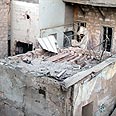

Lindenstrauss handed the report to Knesset Speaker Dalia Itzik on Wednesday, and said, “The report speaks for itself … the criticism doesn’t include compromises or concessions, it isn’t vague, and it doesn’t use pretty words – criticism should be pointed, courageous, and fair.”
Itzik commented on the report and said, “I don’t get the impression that the comptroller is out to get the prime minister. We are all guilty. The Knesset is grateful to the comptroller.”
The report was prepared from September 2006 through March 2007 by a number of teams comprised of dozens of workers at the State Comptroller's Office.
The teams collected thousands of documents and heard the testimonies of dozens of officials, including ministers, military officials, police officers, heads of local authorities, and representatives of private organizations which aided the home front during the war.
The material collected was analyzed and handed over to the bodies mentioned in the report in March 2007 in order for them to present their remarks and responses.
The Second Lebanon War lasted 34 days, during which 41 citizens and 119 soldiers were killed, and thousands of civilians and soldiers were injured. During the war, Hizbullah launched some 3,900 rockets at Israeli communities and IDF bases in the north.
Failure in handling home front
The state comptroller's report points to a large number of failures, some of them extremely severe, in terms of the authorities' preparedness to handling the home front at times of emergency and the functioning of the government.
According to the report, "The handling of the home front during the war was extremely inadequate… The state's leaders invested most of their efforts in the fighting in Lebanon, rather than in handling the home front which suffered comprehensive injuries and damage from the first days of the war.
"On the eve of the war, the government was presented with the evaluations of professional bodies, according to which the home front was more than likely to suffer, and the extent of damage and injuries was even mentioned in the evaluations.
"However, in spite of the fact that the government knew in advance that the home front would suffer significantly, and in spite of the fact that this was realized shortly after the war was launched, the government did not evaluate the situation until July 30, 2006, including a detailed presentation of the home front's preparedness for the expected rocket fire.
"This conduct left a 'vacuum' in the handling of the home front and left the residents of the north exposed, vulnerable and with no defense during a most difficult period of time. The severe failures in handling the home front during the war reached a situation of 'spiritual weakening.'"
Significant delay in handling situation
According to the report, as the war was launched the prime minister and ministers discussed the significant damage and injuries the home front was expected to suffer, and the prime minister even instructed the government ministers and the heads of the defense establishment to prepare for "a new reality" in the home front.
"However, the expected damage to the home front was not translated by the government ministers and the defense establishment into actions and comprehensive, systemic preparedness… The home front issue was not examined as required and the significance it was given in the decision making process was inappropriate," the state comptroller says.
"The conduct of the prime minister, the ministers and the responsible bodies was in most cases reactive – not initiated – and partial, inappropriate and in some cases was carried out in a significant delay."
Lindenstrauss rules that once the vagueness regarding the different bodies' responsibility toward the home front – and the northern residents' extreme distress – were revealed, the State authorities should have taken an expanded approach of claiming responsibility and taking operative steps to fix the failures in real time.
"This is the appropriate moral approach, this is the important leadership test," the comptroller says, but adds that "this was not done. The failure and destruction revealed regarding the home front's preparedness and functioning during the Second Lebanon War are significant and severe."
The report notes that the government, the Defense Ministry and the IDF – mainly the Home Front Command – did not implement during the first stages of the war any previously prepared contingency plans for handling and controlling the home front in times of emergency, although these plans could have allegedly provided tools and solutions for a significant part of the problems discovered in the home front during the war.
Partial solutions for the elderly
Addressing the conduct of the Home Front Command, the comptroller asserts that "the limited approach in terms of aiding the civilian population contributed to the failures in handling the home front during the war.
"The failure to operate the resources and manpower subject to the Home Front Command at the time of an ongoing and wide-scale event, which affects all residents of the north, is a serious failure."
The report also states that the handling of weak populations in the home front was inadequate. According to the findings, "The relevant ministries did not deal with the weak populations according to an organized plan for times of emergency.
"The solutions provided by the responsible government offices and some of the local authorities for meeting the needs of special population groups – elderly people, the disabled and others – were delayed and only partial.
The vacuum left by the State authorities was filled by private and public bodies that volunteered to help the population in the north. They should be blessed for that."
The comptroller also censured the government over its handling of the hazardous materials during the war: "The handling of reserves of hazardous materials in the vicinity of residential areas was deficient in the most severe of manners."
The report added that the Home Front Command and the Ministry for the Environment had failed in handling the issue by issuing contradictory instructions.
Years of neglect
The comptroller added that successive governments had overlooked the preparedness of the civilian population for times of war. "Successive Israeli governments for years failed to fill their responsibilities with regards to the home front and did not study its readiness for times of war."
The report found that various government branches, from government ministries to local authorities, were unprepared for war.
In addition, the report pointed to three major failures: the lack of a national center for managing local authorities in times of war, the lack of an overall policy conceived by successive Israeli governments, and the lack of policy within government ministries and local authorities aimed at dealing with civilian population in times of war.
"The shelters in every part of the home front were designed for short stays and were unfit for prolonged stays. There exists a large gap between the required and the existent when it comes to shelters and fortified buildings. Most of the population lack substantial protection from rocket attacks," the report said.
"Budget cuts over the years, which were approved by successive Israeli governments, were approved with no consideration of their implication on the home front in times of emergency, and they severely harmed the front's preparedness."
The comptroller recommended the government commission a budget study to improve the home front's preparedness.
"An urgent solution to the identified problems should be found through both a general examination of the State's readiness for and focusing on improving the front's capability to deal with emergency situations."















